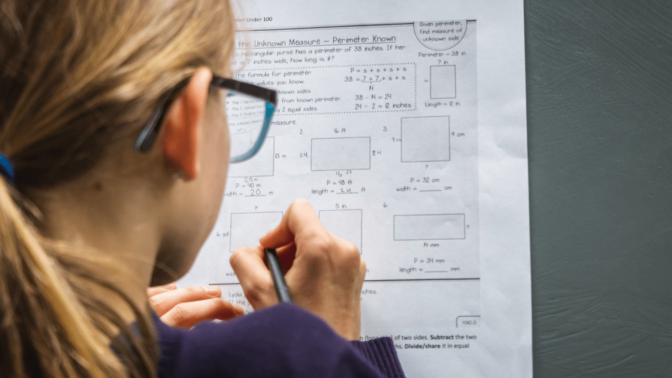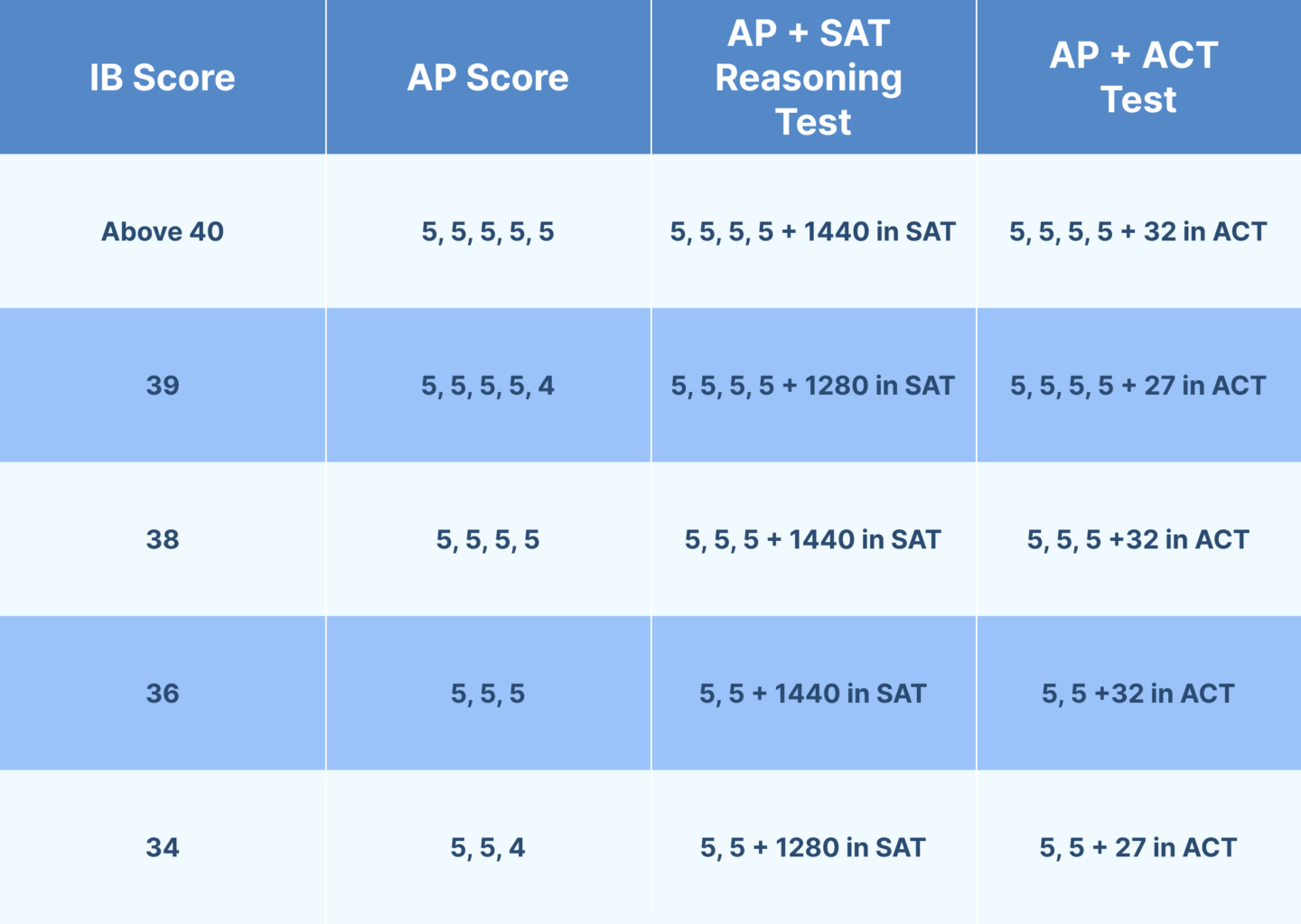What is the IB Grading Scale and How Does it Work?

Dreaming of studying at a top university? Aiming for the prestigious International Baccalaureate Diploma Programme (IBDP) can open many doors. As a result, many students wonder how their progress is assessed and what IB scores they need to gain acceptance to the university of their choice. That’s why it is important to understand the IB grading scale and how it stacks up against other educational qualifications.
In this guide, you will learn all about the benchmarks of your success: how the IB score scale works, how many points you need, what is an average grade, and even how to compare IB with A-Level and Advanced Placement results.
What is the IB Grading Scale?
The IB grading scale assesses the performance of students taking the IBDP, a two-year qualification for high schoolers. The scale ranges from 1 to 7, with 7 being the highest result:
- 7: Excellent;
- 6: Very good;
- 5: Good;
- 4: Satisfactory;
- 3: Mediocre;
- 2: Poor;
- 1: Very poor.
The IB grading scale goes beyond just final exams. Instead, it relies on a comprehensive approach involving coursework and assignments throughout the IB curriculum using a variety of criteria specific to each subject. These criteria focus on two key things: how well students grasp the material and how they use critical thinking to solve real-world problems.
This emphasis on ongoing work means you have multiple opportunities to showcase your skills and knowledge. Simultaneously, the grading system challenges students to reach their academic potential. While achieving high marks in IB demands dedication, it prepares graduates for college and beyond. In fact, many universities worldwide offer college credit or advanced standing to students scoring well on IB assessments.
How does IB Grading Work?
Over the course of two years, IB students study 6 subjects of their choice. Three of these subjects must be studied at the Standard Level (SL) and the other three at a more advanced, Higher Level (HL).
Each subject is graded individually based on a combination of internal assessments (such as research papers) and external exams. Overall, these assessments bring 42 points. Three more points come from the core components of the program, Theory of Knowledge (TOK) and Extended Essay (EE):
Theory of Knowledge is a course spanning 100 hours, which intends to cultivate critical analysis and rich insight into different aspects of knowledge. The assessment involves an oral presentation as well as a 1,600-word essay.
The Extended Essay is a 4,000-word independent research that enables self-directed exploration into a chosen topic. With supportive guidance from a supervisor, it allows students to try their hand at academic inquiry fuelled by their curiosity and interests.
The third component, Creativity, Activity, Service (CAS) is not assessed. However, to complete the IB programme, students must engage in experimental activities suggested by this essential core component.
To obtain the diploma, a student needs to earn a minimum of 24 points out of 45. At least 12 of these points should come from HL subjects and 9 points from SL. At the same time, they need to meet the minimum requirements for the core components, i.e. no lower than D for TOK and EE.
What is an Average IB Score on the IB Grading Scale?
Naturally, the average IB score varies significantly depending on location and school. Having said that, The IBDP Provisional Statistical Bulletin can provide great insight into students’ academic performance around the globe.
In 2023, the average score across 20,000+ students in 1340 schools worldwide was 29.1 (corresponds to a 4.6 grade) out of a maximum of 45. This represents a decrease from the average of 31.0 points (corresponds to 4.9) in the previous year.
This is due to the fact that IBO shifted grade boundaries by around 10% in 2020 – 2022 due to Covid but it brought them back to pre-Covid levels in 2023. For instance, to get a 7 in Biology (HL) one needed 71 points in 2022 and 77 points in 2023. 6 was awarded for 57-70 points in 2022 and 64-76 in 2023, and so on. Hence, we can’t objectively compare 2023 IB results with recent years.
Instead, it makes sense to contrast the 2023 and 2019 exam results. If we do so, we can see that the average score has even slightly increased from 28.5 to 29.1.

These numbers (29.1 out of 45) attest to the challenging and demanding IB curriculum. After all, the IB program is designed to prepare students for the rigours of studying at a university. Only 9.7% of students who took the IB in 2023 achieved a score of 40 points or above, which highlights the dedication and hard work required to excel in the program.
When it comes to the best-scored subjects, Language Acquisition takes the lead with an average of 5.2. The lowest average grades, as expected, were in Mathematics and Sciences, with 4.0 and 4.3 respectively.
What IB Score is Considered a Good Score?
While a good IB score is subjective and depends on your goals, hitting 30 or above is a solid achievement. Only 50% of IB students worldwide can get more than 30 points.
When it comes to the perfect score of 45, IBO decided to no longer reveal this data. Instead, they recognize the achievements of high-scoring students who earned 40-45. In 2023, there were fewer than 10% of such graduates. That being said, the data from the previous years can give an idea of the number of top-scoring students. In 2022, for example, only 1.1% managed to get the maximum score of 45.
Yet, you don’t need a perfect score to enter a solid university. For example, to become a student at the University of Amsterdam, 34 points may suffice. Applicants with EPFL (Switzerland) need at least 32 points. MacGill University requires 37 points and the University of Manchester (UK) – between 30-39. Unsurprisingly, the IB bar is set high for the Ivy League (Harvard, Yale, etc.) and other selective American universities like Stanford. Admitted applicants hold between 40-45 points on average. Besides, the admission committee looks closely at individual grades – to stand a chance, your grade should be higher than 5 across the required subjects.
But don’t get upset if you end up with an average score. There are plenty of good options if you receive 24-30 points. With these, you may consider, for example, Troy University (USA), Hult International; Business School (USA), European School of Economics London (UK), European School of Economics Rome (Italy), and many others.
Just remember, that universities don’t just look at numbers. Your extracurricular activities, essays, personal statements, and recommendations all play an important part. So, while a good IB score is important, it’s just one piece of the puzzle!
What does the Number 7 in IB Equate to in Other Systems?
As you already know, 7 is the highest score on the IB grading scale, and it is basically a recognition of students’ exceptional understanding of the material. You might be wondering how it corresponds to high-school educational qualifications common in other countries.
When it comes to A-Level, a UK qualification, 7 in IB is equivalent to an A*. This grade is based on the percentage of marks obtained in the final exams, with an A* requiring at least 90%.
In the United States, you may have to compare IB to Advanced Placement (AP). The highest score on the AP scale is 5. To achieve it, students need to get a composite score consisting of points for multiple-choice and free-response sections of the exam. It usually takes 75% of points to get a 5 on an AP exam, although the percentage may vary depending on the subject.
As for the French Baccalaureate, 7 in IB is similar to a 20/20, which is the weighted average of the scores awarded in the written and oral exams. Students receive 20/20 when they have a minimum of 95% of the right answers.
How IB Scores are Converted to A-Level and AP Scores
To answer this question, we invited our University Applications Advisor, Dr. Daniele Labriola, BA at the UC Berkeley, MLitt & PhD at the St. Andrews University. He has dedicated over 10 years to assisting families and schools to prepare students for the top-tier of higher education institutions.
According to Dr. Labriola: “The top grade on the IB grading scale is roughly worth the same as the highest grade of the A-Level, AP, and French Baccalaureate. And yet, there is no universally recognized conversion between IB and A-Level or IB and AP”.
Still, you might be wondering how your scores stack up against other systems. Dr. Labriola suggests using so-called UCAS points. Designed by the University and College Admissions Service, they help higher educational institutions compare applicants with different qualifications.
IB to A-Level Scores Conversion
So, according to UCAS, IB High Level grades correspond to the following:
- 7 in IB HL = A* in A-Level (both score 56 points on the UCAS scale);
- 6 in IB HL = A in A-Level (both are 48 points);
- 5 in IB HL = C in A-Level (both are 32 points);
- 4 in IB HL = D in A-Level (both are 24 points);
- 3 in IB HL– roughly E in A Level (12 points and 16 points respectively);
- 1 and 2 grades HL bring no points.
When it comes to Standard Level grades, the picture is drastically different:
- 7 in IB SL (28 points) is between C (32) and D (24);
- 6 in IB SL equals D in the A-Level (both worth 24 points);
- 5 in IB SL is the same as E in A-Level (both are 16 points);
- 4 in IB SL (12) and 3 in IB SL (6) are worth less than E grade at the A-Level scale, while 2 and 1 bring no points at all.
As for the final result, you can convert IB scores to A-Level scores in such a way:
- 45-43 points: A*; A*; A*.
- 42-41 points: A*; A*; A.
- 40-39 points: A*; A; A.
- 38-37 points: A; A; A.
- 36-35 points: A; A; B.
- 34-33 points: A; B; B.
- 32-31 points: BBB.
- 30-29 points: BBC.
- 28-27 points: BCC.
- 26-24 points: CCC.
IB to AP Scores Conversion
When comparing IB with the US high school system, it’s best to look at several indicators:
- AP scores in specific subjects during the last three years of high school;
- The results of SAT/ACT;
- Grade point average (GPA) for school/internal assessments.
Usually, you can convert your scores from IB to AP like this:

Universities may also look at GPA, the sum of the grade points earned in your classes, divided by the number of credits. The maximum on the GPA scale is 4.0, which equals 40+ IB points. A 3.3/4 GPA corresponds to IB between 35-38 points, while 3.0/4 is 30-34.
To conclude, this is just a rough idea of how you can convert IB scores to A-Level and AP. You should keep in mind that every college and university has its own requirements and credit systems. Many offer advanced standing or placement to students who have achieved certain scores in IB subjects. So, make sure to check the credit policies and requirements of the universities and courses you are interested in before applying.
How do You Get a Perfect 45 in IB?
Let’s make it clear – you don’t need the perfect score to enter a good university. Yet, earning a perfect 45 in the IB Diploma may still be your big goal. The question is how to do it.
The truth is that the path to academic excellence demands dedication, passion, and strategic support. Practice makes perfect still holds weight! But don’t just passively read. Instead, you can engage with the material through practice questions, summaries, and self-testing. Here are some other preparation and skill development tips you can use:
Sharpen your analysis skills: Learn to break down complex information, identify key points, and form well-supported arguments.
Boost your writing skills: Practice crafting clear and well-structured responses.
Master time management: Learn to allocate time effectively during exams and practice under timed conditions with past papers.
Develop exam-taking strategies: Understand different question types, identify common pitfalls, and learn effective answering techniques.
But what about when practice alone isn’t enough? That’s where TutorsPlus comes in.
Even the most brilliant minds can benefit from specialized guidance. TutorsPlus is a team of experienced professionals who not only understand the IB curriculum but also know how to boost your potential. That’s because we are more than just tutors. Rather, we are mentors, motivators, and learning strategists.
Whether you need to improve your study skills, master exam-taking strategies, or anything in between, we are here to help. Remember, a perfect 45 isn’t just about raw intelligence; it’s about strategic learning and maximizing your strengths. Call TutorsPlus at 022 731 8148 and let us show you how to achieve your best.
IB Grading Scale: Conclusion
Now that you have a better understanding of the IB grading scale, you can approach university applications with clarity and confidence. Just remember that grades alone don’t provide a full picture of who you are as a learner. You need to make sure that your IB journey is a reflection of your experiences, passions, and aspirations.
FAQ
What is an IB failure score?
The minimum passing criteria for the IB Diploma Programme is 24 points. However, to get a diploma, you have to meet other criteria. In particular, you need to:
- Complete the three core components: Theory of Knowledge, the Extended Essay and Creativity, Activity, Service;
- Ensure that you don’t receive E in Theory of Knowledge and Extended Essay;
- Achieve a grade of at least 2 in all subjects;
- Get at least 12 points in HL subjects and a minimum of 9 points in SL subjects;
- Avoid a combination of more than three grades of 2 and 3;
- Receive no penalty for academic misconduct.
Which IB subjects are the easiest and most difficult?
We should point out that no IB subject is “easy”. However, one way to answer this question is to look at the average grade.
With 5.2, Language acquisition is a clear winner. It also has the greatest number of 7s – 14.4% of students received the highest score.
Interestingly, although Studies in Language and Literature have the second highest average grade (4.8), they were the hardest in terms of getting 7 – only 2.7% of graduates in 2023 could achieve it.
Mathematics and Environmental Systems and Societies find themselves on the more difficult side as well with an average of 4.0. While Mathematics provided a fair chance to receive the top grade (and 7.8% of students attained it), only 2.8% of those who studied Environmental Systems and Societies managed to get a 7.
The lowest % of students getting high grades was Computer Science at SL due to the average grade of 3.2 and only 1.7% of the top grades.
What IB score is required for admission to Harvard, MIT, Oxford and Cambridge?
It might be hard to believe, but the likes of Harvard and MIT do not typically have specific requirements for IB points. However, with an acceptance rate of 12% or lower, you really need to be at the top of your class to have a solid chance of admission at these institutions. In other words, you should aim for 40 points and more.
When it comes to OxBridge (Oxford and Cambridge), the lowest scores that may secure admission are 38-40, depending on the course. You can check specific course requirements to learn which expectations they have. Apart from that, Oxbridge considers IB scores alongside a determined entrance exam.
Don’t forget that top-tier universities take a holistic approach to applications. High grades alone won’t get you in! You need to also have a competitive profile in other areas including essays, extracurricular activities, as well as standout letters of recommendation.
Can I retake IB exams to improve my score?
Yes, you can improve your score by retaking an IB exam, and you can do it at any IB World School. Your IB diploma will feature the highest score for the subject. Please note that if by the time you retake the exam a new curriculum is in effect, you need to follow its requirements.
By Sara Lloyd
Sara has been an education consultant for TutorsPlus for 15 years, and is an expert on international IB education. She is also a parent of two lively children.












